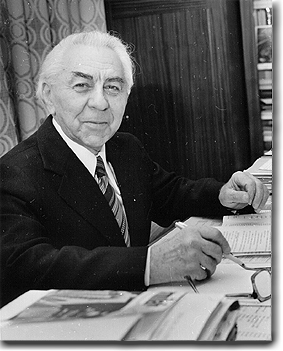 VENEDICT PETROVICH DZHELEPOV
VENEDICT PETROVICH DZHELEPOV
(12.04.1913 - 12.03.1999)
Russian science, the Joint Institute for Nuclear Research have suffered an irredeemable loss. Venedikt Petrovich Dzhelepov, an eminent Russian
scientist and organizational leader of science, a corresponding member of the Russian Academy of Sciences, who devoted over 60 years of his fruitful work to atomic nucleus and elementary particle physics,technology, and applications of powerful accelerators, died on 12 March 1999 at the age of 85.
In the 1940s V.P.Dzhelepov worked on "uranium problem" under the direction of I.V.Kurchatov in
Moscow. Later, all his researches were connected with the accelerators in Dubna and Protvino.
He was among the founders of the Soviet Union's first national high-energy physics research centre,
the Institute of Nuclear Problems of the USSR Academy of Sciences (1948 -1956), and subsequently the international research centre, the Joint
Institute for Nuclear Research, in Dubna. At JINR V.P.Dzhelepov was Director of the Laboratory of Nuclear Problems through 1956 - 1989.
His contribution to advent and evolution of powerful high-energy accelerators in the USSR is
universally recognized. After World War II he was a major
figure in construction of the then world's largest accelerator, a 680-MeV synchrocyclotron, which was put into operation in 1949 and successfully worked for 30 years until it was converted under V.P.Dzhelepov's supervision into a more powerful phasotron in
1984.
V.P.Dzhelepov was among those who pioneered the research on high-energy particle physics in the
USSR. His investigations at the accelerators of Dubna and Serpukhov yielded fundamental results concerning strong interactions of hadrons.
He also initiated and supervised the first investigations in the USSR which soon allowed beams of charged particles to be used for treating cancer.
V.P.Dzhelepov carried out fundamental investigations in muon physics, especially in mu-catalyzed fusion physics. He was one of those who discovered resonance formation of deuterium and tritium molecules providing high efficiency of muon-catalyzed fusion. This discovery triggered extensive development of these investigations in the world. The Russian Academy of Sciences awarded him the I.V.Kurchatov Gold Medal for this research.
V.P.Dzhelepov was widely involved in organizational activities. From 1967 he was a deputy Ącad-
emician-Secretary of the Nuclear Physics Division of the Russian Academy of Sciences. He was a member of the editorial boards of the international journals "Physics of Particles and Nuclei" and "Mu-catalysis". For over 40 years he chaired the Scientific Council of the JINR Laboratory of Nuclear Problems for conferring degrees and academic ranks.
V.P.Dzhelepov's research and organizational activities found wide recognition. He was awarded two
State Prizes of the USSR, the Order of Lenin, two Orders of the Red Banner of Labour, orders of Bulgaria, Mongolia, Hungary, and many medals.
V.P.Dzhelepov trained and educated several generations of physicists, now engaged in extensive
investigations at JINR and at the largest scientific centres in our country and abroad.
...Indelible are memories of his charming personality, his inherent sense of high human duty,
exceptional friendliness and consideration for people, great modesty and high level of culture.
We shall always remember Venedikt Petrovich Dzhelepov, an outstanding scientist, a great patriot of
his country and a remarkable man.
| 


